The Nova Scotia Duck Tolling Retriever, like every purebred dog, is affected by a variety of genetic diseases and conditions.
Some diseases have definitive genetic tests that breeders can take advantage of. Some conditions have subjective tests such as x-rays that can help guide a breeding program. In both instances, breeders have some ability to screen breeding stock to prevent puppies from being affected.
The following is a list of diseases and conditions that can affect the Toller. This list is by no means exhaustive, but covers the more common health problems in the Toller breed. If you would like more information, please contact us here or speak with your Veterinarian.
Auto-Immune Disorders
Auto-immune disease occurs when the dog’s immune system gets confused and attacks the dog’s own body and tissues as if they were a disease.
The range of auto-immune diseases is as wide and varied as the body itself. An overactive immune system may attack the skin, spinal cord, digestive tract, endocrine system, red blood cells, liver or bones.
Auto-immune diseases can be an allergic reaction or a life threatening condition, depending on what organ or system of the body is affected.
With the exception of cancers, auto-immune diseases are the most common disease process affecting Tollers.
Studies have shown that the onset of certain auto-immune disorders are associated to the administration of vaccines.
Cancer
Cancer fatalities in Tollers is approximately 25%. This number is in line with the average for all other breeds and mixed breeds.
Degenerative Myelopathy
Degenerative myelopathy (also known as chronic degenerative radiculomyelopathy) is a progressive disease of the spinal cord in older dogs. The disease has an insidious onset typically between 7 and 14 years of age. It begins with a loss of coordination (ataxia) in the hind limbs which progresses to the front limbs.
Degenerative Mylopathy is a genetic condition for which there is a test. Responsible breeders like Red Shadow Kennels are managing their breeding stock in order to prevent puppies from being affected by this disease.
Degenerative Encephalopathy
Degenerative encephalopathy is a brain disease that presents with sleep disorder and caudate necrosis. There is no cure.
Fortunately, degenerative encephalopathy is genetic and there is a genetic test for it. Responsible breeders like Red Shadow Kennels are managing their breeding stock in order to prevent puppies from being affected by this disease.
Hip/Elbow Dysplasia
Hip and Elbow dysplasia is an abnormal formation of the joint that, in its more severe form, can eventually cause crippling lameness and painful arthritis.
Studies are suggesting that the influence of sex hormones in the development of these joints. There seems to be an association between earlier ( < 18 months) spay and neuter and the development of dysplasia.
Illness, nutrition and injury are also suspected as being causative.
In order to reduce the likelihood of offspring developing dysplasia, Red Shadow Kennels will not use breeding stock rated “poor” by the OFA. We encourage our owners to defer spay/neuter until their puppy is 18 months old We also provide our owners with information on canine nutrition and how to help their puppy engage in safe exercise/play.
Juvenile Addison’s
Addison’s disease (hypoadrenocorticism) occurs when the adrenal glands stop secreting the natural steroid hormones (glucocorticoid) and hormones (mineralicorticoids) necessary for the regulation of sodium and potassium levels in the blood. The clinical signs of Addison’s disease can include lethargy, lack of appetite, vomiting and diarrhea.
In the Toller, a genetic form of this disease, called Juvenile Addison’s, occurs in puppies. The average age of a puppy affected with Juvenile Addison’s is 5 months; however, puppies as young as 8 weeks and as old as 12 months of age have been identified.
Juvenile Addison’s is genetic and there is a genetic test for it. Responsible breeders like Red Shadow Kennels are managing their breeding stock in order to prevent puppies from being affected by this disease.
Progressive Retinal Atrophy, Progressive Rod Cone Degeneration (PRA-prcd)
Progressive Retinal Atrophy, progressive rod-cone degeneration (PRA-prcd) is a late onset, inherited eye disease affecting the Toller.
PRA-prcd occurs as a result of degeneration of both rod and cone type photoreceptor cells of the retina, which are important for vision in dim and bright light, respectively. Most affected dogs show signs of vision loss around 3 to 5 years of age. Dogs will initially have vision deficits in dim light (night blindness) and loss of peripheral vision. Over time affected dogs continue to lose night vision and begin to show visual deficits in bright light.
PRA-prcd is genetic and there is a genetic test for it. Responsible breeders like Red Shadow Kennels are managing their breeding stock in order to prevent puppies from being affected by this disease.
Intervertebral Disc Disease (IVDD)
In late 2017, researchers at UC Davis identified a gene mutation called Chondrodysdrophy (CDDY) in Tollers.
This mutation is responsible for creating a shorter leg length and an abnormal premature degeneration of intervertebral discs. This results in a disease called Intervertebral Disc Disease (IVDD).
Unlike all other genetic conditions that Tollers suffer from, the presence of only one copy of the gene is enough for a dog to be affected by IVDD.
IVDD is not a curable condition but can demonstrate a wide range of affect. Some dogs may show no symptoms. Others, if not properly managed from an early age, can experience partial paralysis or death.
The test for this mutation is now available to the public. Red Shadow Kennels is willing to help any Toller owner who wants more information or to get the test done.
Toller breeders are currently trying to understand the full impact of this genetic mutation on our breeding program. It is well know that the Toller breed suffers from a lack of genetic diversity. We are currently working with other breeders to determine how to leverage the results of this study without losing any further diversity or causing any other unwanted health issues.
Regardless of how Toller breeders move forward, our recommendation to all Toller owners is to keep your dog physically fit and at an ideal weight. While this condition is an inheritable one, the impact of the resulting disease is minimized with exercise and a healthy diet.

